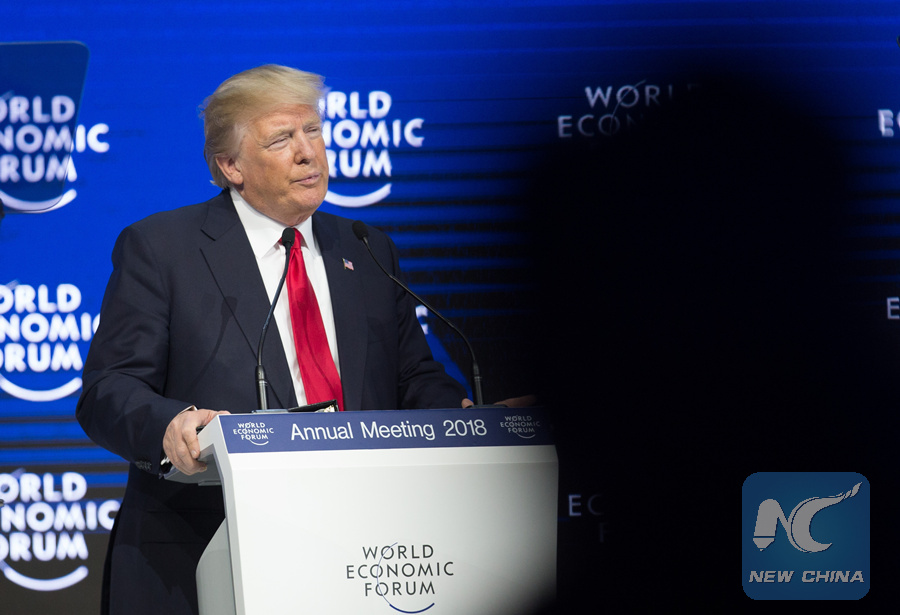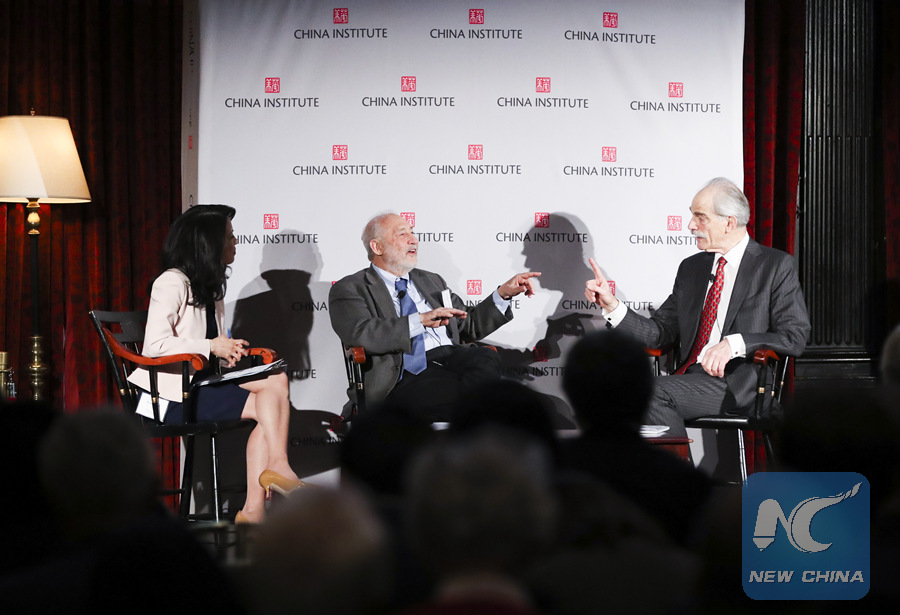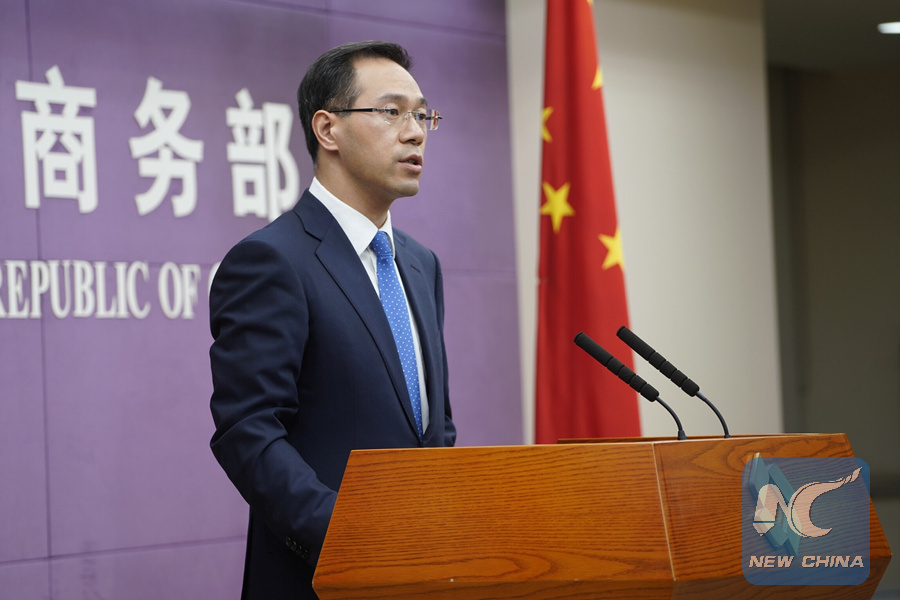BEIJING, April 13 (Xinhua) -- The U.S. unilateralist and protectionist moves to propose steep tariffs on Chinese imports expose the super power's lack of confidence in the more globalized world, especially when facing China's growing international role, said analysts.
The world's two largest countries are developing in different directions, experts said, with China becoming more open and pursuing fairness, while the United States has become more self-preserving and anti-globalization.

U.S. President Donald Trump delivers a speech during the 48th annual meeting of the World Economic Forum (WEF) in Davos, Switzerland, in the file photo taken on Jan. 26, 2018. (Xinhua/Xu Jinquan)
UNILATERALIST APPROACH AGAINST MULTILATERAL REGIME
Amid domestic and overseas opposition, the Trump administration has threatened to slap additional duties on Chinese goods worth 100 billion dollars, after proposing steep tariffs on Chinese imports worth 50 billion U.S. dollars.
The U.S. unilaterally proposed steep tariffs on China's goods undermine a rule-based multilateral trade regime, which has been crucial for global growth, said Nobel Prize-winning American economist Joseph Stiglitz.
The U.S. unilateral approach will be a step backward for globalization and cause unbearable outcomes, said former Chinese Commerce Minister Chen Deming at the just concluded Boao Forum for Asia (BFA) annual conference.
Joaquin Infante, the winner of Cuba's national economic prize, told Xinhua recently in an interview that the U.S. contempt for multilateral organizations, such as the United Nations and the World Trade Organization, aims to return to the decades when the United States showed off its economic supremacy.
Jon R. Taylor, a political science professor at the University of St. Thomas in Houston, Texas, agreed with him, saying: "These tariffs that have targeted China confirm that the Trump administration intends to bypass the WTO's dispute settlement body and unilaterally rely on U.S. law alone regarding the ongoing trade dispute with China."
Klaus Wohlrabe, economist at Ifo economic institute based in Munich, Germany, said the U.S. unilateral moves would severely harm the multilateral mechanism under the framework of the WTO.

Nobel Prize-winning American economist Joseph Stiglitz (C, Rear) and John Lipsky (R, Rear), distinguished scholar, School of Advanced International Studies, Johns Hopkins University, attend a panel discussion, part of the China Institute 2018 Executive Summit, "U.S.-China Business in the New World Order," in New York, the United States, on April 12, 2018. (Xinhua/Wang Ying)
NO WINNER FOR ALL
The U.S. willful moves to propose steep tariffs on Chinese imports would have a negative impact not just on China and the United States, but also on the global economy, analysts believe.
Kiyoyuki Seguchi, research director of Canon Institute for Global Strategy Studies said in a written interview that in the short term, the protectionism has some positive effects on its domestic industries and brings some benefits, such as increasing employment.
In the medium and long term, protectionism will weaken the U.S. competitiveness and have negative effects on domestic consumers and enterprises, he wrote.
Martin Wansleben, chief executive of the Association of German Chambers of Commerce and Industry, said Trump administration's disregard of international rules and regulations against the backdrop of closely interconnected global economy will lead to no winners, adding Germany and the European Union will be affected finally.
Francis Gurry, director-general of World Intellectual Property Organization, said "technology and production are all globalized" and "the global value chain will be affected by even a dispute between two parties as many other parties are also involved in the chain."

Gao Feng, spokesperson with China's Ministry of Commerce, speaks at a press conference in Beijing, capital of China, on April 6, 2018. (Xinhua/Xing Guangli)
WHERE TO GO?
China has hit back against the U.S. unilateral moves proportionally by rolling out its retaliatory tariff plan.
"China was forced to take the action to fight back. There's no way for China to back off," said Ruan Zongze, executive vice president and senior research fellow of the China Institute of International Studies.
"China has to defend its legitimate interests as well as the global multilateral trade regime," Ruan said.
Oxford Economics, a leader in global forecasting and quantitative analysis based in Oxford, Britain, believes that China's reaction is a kind of tactic aiming only to encourage Washington to start talks to reduce the risk of a potential full-scale trade war.
Andras Inotai, research professor at the Hungarian Academy of Science's Institute of World Economics, described the U.S. tariffs move as a "own-goal," saying a sound solution to any trade dispute should be filed at the WTO.
Lawrence Loh, director of Centre for Governance, Institutions and Organizations at the Business School at the National University of Singapore, said: "The United States may actually shoot itself in the foot and risk losing global economic leadership."
"Constructive dialogues should take place to iron out whatever issues that might be bothering either the U.S. or China," he said.
(Xinhua correspondents Wen Xiqiang in London, Zhu Sheng in Berlin, Qian Zheng in Tokyo, Liu Xiaoyu in Singapore and He Jing in Beijing contributed to the story.)

